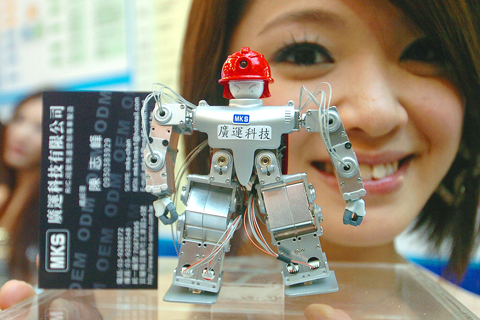The 2008 Taipei International Robot Show opened at Taipei World Trade Center Exhibition Hall I in Xinyi District (信義) yesterday, featuring the locally designed BeRobot, which, at 15.3cm, set a Guinness World Record as the smallest humanoid robot.
Ministry of Economic Affairs statistics indicated that local companies had invested NT$5.83 billion (US$191.85 million) in the intelligent robot industry.
“Since 2005, the government has included the robotics industry in its national development plan and aims to make Taiwan a global manufacturing and design center for intelligent robotics by 2015, hoping to boost the annual production value to NT$250 billion” from less than NT$40 billion, Vice President Vincent Siew (蕭萬長) said at the expo’s opening yesterday.

PHOTO: CHIEN JUNG-FONG, TAIPEI TIMES
To achieve this goal, the government has invested NT$35 million this year to assist the industry in product development, which has benefited 35 companies and should generate a production value of at least NT$1.4 billion, a report by the industrial development bureau said.
The BeRobot weighs 250kg and was developed by the Taoyuan-based GeStream Technology Inc (極趣科技).
BeRobot can be controlled by remote control or by vocal command and can perform a wide range of actions, including walking, dancing, push-ups and even Tai Chi.
BeRobot can also transform into various animal forms and is mainly used for educational and entertainment purposes, the company said.
GeStream Technology chief operating officer Sean Chang (張合右) said yesterday that the company received recognition for its Guinness World Record in January for the smallest robot to be mass produced.
Chang expects the company to sell between 3,000 and 5,000 units of BeRobot — priced at NT$16,000 — this year, with 500 to 600 units on the domestic market.
Chang said that the company had invested almost NT$40 million in research and development for the product over the past four years.
The company expected sales of BeRobot to help it turn a profit this year.

Nvidia Corp’s demand for advanced packaging from Taiwan Semiconductor Manufacturing Co (TSMC, 台積電) remains strong though the kind of technology it needs is changing, Nvidia CEO Jensen Huang (黃仁勳) said yesterday, after he was asked whether the company was cutting orders. Nvidia’s most advanced artificial intelligence (AI) chip, Blackwell, consists of multiple chips glued together using a complex chip-on-wafer-on-substrate (CoWoS) advanced packaging technology offered by TSMC, Nvidia’s main contract chipmaker. “As we move into Blackwell, we will use largely CoWoS-L. Of course, we’re still manufacturing Hopper, and Hopper will use CowoS-S. We will also transition the CoWoS-S capacity to CoWos-L,” Huang said

Nvidia Corp CEO Jensen Huang (黃仁勳) is expected to miss the inauguration of US president-elect Donald Trump on Monday, bucking a trend among high-profile US technology leaders. Huang is visiting East Asia this week, as he typically does around the time of the Lunar New Year, a person familiar with the situation said. He has never previously attended a US presidential inauguration, said the person, who asked not to be identified, because the plans have not been announced. That makes Nvidia an exception among the most valuable technology companies, most of which are sending cofounders or CEOs to the event. That includes

INDUSTRY LEADER: TSMC aims to continue outperforming the industry’s growth and makes 2025 another strong growth year, chairman and CEO C.C. Wei says Taiwan Semiconductor Manufacturing Co (TSMC, 台積電), a major chip supplier to Nvidia Corp and Apple Inc, yesterday said it aims to grow revenue by about 25 percent this year, driven by robust demand for artificial intelligence (AI) chips. That means TSMC would continue to outpace the foundry industry’s 10 percent annual growth this year based on the chipmaker’s estimate. The chipmaker expects revenue from AI-related chips to double this year, extending a three-fold increase last year. The growth would quicken over the next five years at a compound annual growth rate of 45 percent, fueled by strong demand for the high-performance computing

TARIFF TRADE-OFF: Machinery exports to China dropped after Beijing ended its tariff reductions in June, while potential new tariffs fueled ‘front-loaded’ orders to the US The nation’s machinery exports to the US amounted to US$7.19 billion last year, surpassing the US$6.86 billion to China to become the largest export destination for the local machinery industry, the Taiwan Association of Machinery Industry (TAMI, 台灣機械公會) said in a report on Jan. 10. It came as some manufacturers brought forward or “front-loaded” US-bound shipments as required by customers ahead of potential tariffs imposed by the new US administration, the association said. During his campaign, US president-elect Donald Trump threatened tariffs of as high as 60 percent on Chinese goods and 10 percent to 20 percent on imports from other countries.